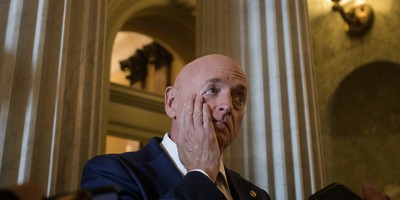When the G8 summit met in Belfast earlier in the summer, one overriding ambition drove the grand panjandrums of international order: the imperative of squeezing more money out of people and corporations.
Sure, these international Fagins—that’s the famed “receiver of stolen goods” in Charles Dickens’ Oliver Twist—didn't quite frame the issue that way.
Instead, these officials, high-living if not entirely high-minded, spoke in more mundane terms of going after “tax havens” or the need to target “aggressive tax planning.” But the real theme of the meeting was best summed up by the lyrics of Joel Gray’s famous song in Cabaret: money, money, money. Send it, send it, send it, whether you approve or disapprove of the ends to which it will be put. Might I just add that this isn’t optional? The word coercion springs to mind.
This is not just an international phenomenon. Whatever the Federalists believed about the purpose of government, the current purpose of the United States government as it presently operates is to extract money from the citizens and the companies in which they invest or for which they work—or would work, if such companies had enough money and independence from government nitpicking to hire.
Here is a thought experiment: name the recent debates in Congress or initiatives (a great word, by the way, it’s so vague it takes a while to figure out that it’s fancy for money hole) that don’t revolve around taking money from taxpayers.
Recommended
The looming debt ceiling debate is really about whether we shall—note the coercive shall—be required to send even more money to Washington. The media won’t tell us that, of course. If Congress balks at raising the debt ceiling, we will be told that this is irresponsible because the money is already effectively spent. It’s passé to be too concerned about just where all this already-spent money will come from; it’s unsaid but assumed that we all know the truth, that eventually it will be taken one way or another from American workers’ hide.
For President Obama, pillaging the taxpayers is the sine qua non of governing. He does this because he is a believer in the expansion of government and because he requires money for his programs. These programs may accomplish nothing beyond the spending of money—but that is enough for too many in Washington. It is only important that these programs sound public-spirited so that taxpayers or political parties that balk at being pillaged can be portrayed as inimical to the commonweal.
The president may know, for example, that his pre-school initiative--a reiteration of Head Start, which, even according to a government study, has little beneficial impact on children--won't improve education. But it sounds good and will benefit some at the expense of many, even if it is primarily a waste of money. After all, being ineffective hasn't dimmed the political luster of Head Start.
One of the reasons that government must extract so much money from us is that it has a huge bureaucracy to support. Go to any upscale bar in Washington on a Friday after work, and you’ll see it jammed to capacity with people who work for the government or who have come to town to ask for something from government. Surely, the Roman Empire at its zenith didn’t have a comparable army of civil servants, this plague of locusts who are now paid more than they could earn in the private sector. But, of course, the only purpose of the private sector is to generate money for the public sector.
These government employees don’t make products that sell—they don’t even create or run policy that works. But they enjoy perks and paychecks that seem arbitrary to us payers.
Did you know that some IRS employees don’t even live in the same city with their offices and are reimbursed six figures for the airfare to commute? Did you know that Huma Abedin—aka Mrs. Anthony Weiner—was paid $135,000 for a part-time, work-at-home position in Hillary Clinton’s State Department, while Ms. Abedin was simultaneously earning $355,000 in the private sector as a consultant? Either Ms. Abedin is the greatest foreign affairs strategist in history or somebody made a bizarre financial decision of the sort you can only make when money—because it’s other people’s money—is no object.
Waiting for a friend yesterday at the Clarendon Metro stop, I picked up a copy of Politico. There was a two-page ad from University presidents urging President Obama and Congress to “close the innovation gap.” I knew instantly what they wanted: more money. Instead of raising money themselves—and this is money that will go to their institutions for their salaries and the like—they take the easier path of urging the government to force us to pay more and more for their left-leaning, administrator-heavy institutions.
Nowadays, it’s the American way. Yet the pick-pocketers should be warned that America’s wallets are getting awfully thin.

























Join the conversation as a VIP Member